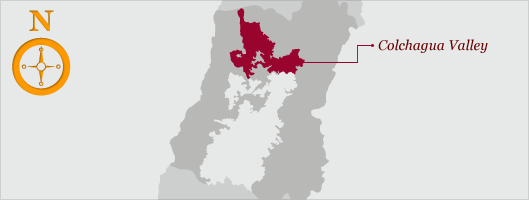Chile

Our Winery
Our winery combines features from the 1920s with state-of-the-art technology. The structure of the original cellar has been preserved intact, with thick adobewalls to insulate from outside heat or cold, providing stable conditions for the aging of fine wines at optimal temperatures.
In 2009, an additional cellar was built to expand production of premium wines. It houses 2,800 American and French oak barrels.
Our Vineyard
Viña Requingua’s vineyards are in the Central Valley of Chile, where a mild Mediterranean-type climate and varied soils offer superb conditions for growing numerous varieties of the same noble grapes that are cultivated in Europe. The narrow Central Valley lies between the snow-capped Andes and the cold coastal currents of the South Pacific. Long, dry summers with radiant days and cool nights help grapes attain their maximum potential for color, aroma and flavor.
Colchagua Valley

Finca Lolol
This farm is north of the Curic� Valley in the Colchagua Valley, renowned for its full-bodied Cabernet Sauvignon wines. The Colchagua Valley has hotter summers but with constant cooling breezes from the coast and more temperate winters.
The dark loam soil in the flatter areas of Lolol vineyard is deep, sprinkled with gravel and round stones in lower depths. On the hillsides, the soil is also deep loam, strewn with jagged colluvial stones. These are excellent soils for the Cabernet Sauvignon grapes that are cultivated on all 22 hectares of vineyard.
Curic� Valley

Fundo Requingua
Our main vineyard is in the estate named Requingua, which means Corner of the Winds. Requingua is in the Lontue River watershed, part of the Curic� Valley, which has burgeoned since the 1970s into a prestigious producer of internationally recognized wines.
Requingua is 80 kilometers (50 miles) from the Pacific and 60 kilometers (37 miles) from the Andes. The influence of the ocean and the mountains results in the markedly lower night temperatures that high-quality grapes require. This day-night temperature fluctuation has a positive effect on the development and maturation of aromas and polyphenols in our grapes.
Although the summer sunshine is intense, cool afternoon breezes from the ocean contribute to the gradual maturing process that gives grapes the best color and fragrance.
The 1,200-hectare property includes 334 hectares of vineyards spreading out below a high, steep hillside. (1 hectare = 2.2 acres.) The vineyard is irrigated with waters brought from the high Andes by canal. Rainfall, almost all in the chilly winter, averages 600 milliliters (23.6 inches) a year.
In addition to ideal climate conditions that enable optimal ripening of the fruit, our grapes are cultivated in various types of soils, which help define the specific characteristics of each of our wines.
Maule Valley

Fundo Yerbas Buenas
Vina Requingua owns 120 hectares called Yerbas Buenas in the Maule Valley, a traditional but lesser-known winegrowing region. The valley has been garnering increased attention for its production of high-quality grapes.
Because the Maule Valley is farther south than the Curic� Valley, and because Yerbas Buenas is closer to the Andes, the climate is cooler and rainier in the winter and summers are less intense. The rocky alluvial soils are relatively shallow, composed of loam and clay. These conditions enable our viticulturists to craft excellent, aroma-driven white wines as well as red wines with moderate alcohol content and exceptional aromatic intensity.
Eighty-six hectares of the Yerbas Buenas estate, northeast of the city of Linares, are planted in six varieties of grapes: 28 hectares in Cabernet Sauvignon, 15 in Chardonnay, 14 in Pinot Noir, 12 in Sauvignon Blanc, 10 in Merlot and 7 in Sauvignon Gris.
Fundo Huaquen
Also in the Maule Valley, Fundo Huaquen lies in rolling hills of the coastal mountains west of the city of Talca. This estate’s higher altitude and proximity to the Pacific moderate its daytime summer temperatures and keep its nights cool and relatively humid.
The reddish piedmont soils of loam and clay are laced with gravel, which enhances drainage in undulating vineyards cultivated under Requingua’s specifications and close supervision. Ten hectares are planted in Carmenere, 10 in Syrah, 9 in Cabernet Sauvignon and 1 in Petit Verdot.




















